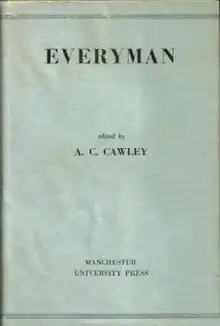Arthur Clare Cawley | |
|---|---|
 First edition cover of Everyman, which Cawley edited | |
| Born | 21 November 1913 Kent, England |
| Died | 7 January 1993 (aged 79) Brisbane, Queensland, Australia |
| Occupation | Academic |
| Education | University College London |
| Spouse | Winifred Cawley (m. 1939) |
Arthur Clare Cawley (21 November 1913 – 7 January 1993) was Professor of English Language and Medieval English Literature at the University of Leeds.
Personal life and education
Cawley was born in the Medway district of Kent on 21 November 1913.[1]
In 1934, Cawley graduated from University College London in 1934. He married felow University College London postgraduate student Winifred Cozens in 1939. Winifred was a teacher and children's author.[2]
Cawley died in Brisbane, Australia on 7 January 1993 at the age of 79.[2]
Academic career
After a year in the Education Department at the University of Hull, Cawley returned to UCL in 1935 for three years as a part-time Lecturer during which time he completed his MA on John of Trevisa's version of Ralph Higden's Polychronicon.[3]
In 1938, Cawley went to Harvard on a Commonwealth Fellowship and, on his return to England, joined the British Council. He went as Professor of English to Iași in Romania until the German invasion forced him to leave and he spent 1941 to 1945 in Egypt and in Benghazi, Libya. Finally, still with the British Council, he taught in Reykjavík, Iceland.[3]
In 1946 Cawley returned to England and after a year at the University of Sheffield was appointed to a Lectureship at the University of Leeds in 1947. He completed his PhD in 1952.[3] His thesis for the University of London was a scholarly edition of six of the thirty-six Wakefield Pageants.[4]
In 1959 Cawley left Leeds to go to the Darnell Chair of English at the University of Queensland, Australia. He remained there for six years before returning to Leeds as Professor of English Language and Medieval English Literature in 1965. He retired from his chair in 1979 with the title Emeritus Professor.[3] As of 2009, the university offered a post-graduate scholarship in his name.[5][6]
A noted Mediaevalist, Cawley has commentated and edited numerous works including "Everyman",[7] mediaeval miracle plays,[7] the Canterbury Tales,[8] and the Wakefield Mystery Plays.[9][10]
References
- ↑ "Freebmd.org.uk, search". Archived from the original on 5 June 2002. Retrieved 2 June 2023.
- 1 2 3 4 Stanley Ellis, 'Arthur Cawley: A Biographical Note', Leeds Studies in English, n. s. 12 (1981), 1-2 (p. 1).
- ↑ Arthur Clare Cawley, ed. (1958). The Wakefield Pageants in the Towneley Cycle (Old & Middle English Texts). Manchester University Press. pp. vii. ISBN 0-7190-0606-6. Retrieved 27 June 2013.
- ↑ "School of English Scholarships – Arthur Cawley Scholarship". University of Leeds. Archived from the original on 30 March 2010. Retrieved 12 October 2009.
- ↑ University of Leeds, Biographical Note
- 1 2 "Everyman and medieval miracle plays". Everyman's Library. 1 January 1956. Retrieved 12 October 2009.
- ↑ "Canterbury tales / Geoffrey Chaucer ; edited with an introduction by A.C. Cawley". London: Dent. 1958. Archived from the original on 14 June 2011. Retrieved 13 October 2009.
- ↑ "The Wakefield pageants in the Towneley cycle / edited by A.C. Cawley". Manchester: Manchester University Press. 1958. Archived from the original on 14 June 2011. Retrieved 13 October 2009.
- ↑ "Wakefield Mystery Plays: Further Information". City of Wakefield: Wakefield Local Studies Department. 29 March 2006. Archived from the original on 3 December 2008. Retrieved 13 October 2009.